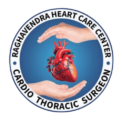Atrial Septal Defect Closure
Appointment Form

Dr. Raghavendra Murthy
MBBS, MS - General Surgery, MCh - Cardio Thoracic and Vascular Surgeron

Best Atrial Septal Defect Closure Treatment in Bangalore
Atrial Septal Defect (ASD) is a congenital heart condition marked by an abnormal opening in the septum that separates the heart’s upper chambers (atria). This opening allows oxygen-rich blood from the left atrium to flow into the right atrium, mixing with oxygen-poor blood. Over time, this can increase the workload on the heart and lungs, potentially leading to complications such as heart enlargement or pulmonary hypertension if left untreated. Atrial Septal Defect closure in Bangalore is a key solution for patients suffering from this condition, offering a chance for improved heart health and quality of life.
Dr. Raghavendra, heart specialist and cardiothoracic surgeon in Bangalore, provides advanced solutions for Atrial Septal Defect closure in Bangalore. With extensive experience in managing ASD across all age groups, he focuses on precision and patient-centered care to achieve optimal outcomes. His expertise and dedication ensure comprehensive guidance and effective treatment options for individuals affected by ASD.
What is Atrial Septal Defect (ASD)?
An Atrial Septal Defect is often present at birth, categorized as a congenital heart defect. It varies in size, and smaller defects may close on their own over time. However, larger ASDs typically require medical intervention to prevent complications like heart arrhythmias, pulmonary hypertension, and eventual heart failure. Patients with an untreated ASD may experience worsening symptoms, and for optimal cardiac health, an early diagnosis followed by treatment is recommended.
Causes of Atrial Septal Defect
Atrial Septal Defect (ASD) is a congenital heart condition, meaning it is present at birth. The exact causes are not always clear, but several factors can contribute to the development of ASD:
- Genetic Factors: A family history of congenital heart defects increases the likelihood of ASD. Certain genetic syndromes, such as Down syndrome or Holt-Oram syndrome, are also associated with an increased risk of ASD.
- Abnormal Development During Pregnancy: ASD occurs when the septum (the wall between the heart's upper chambers) fails to fully develop or close properly during fetal development, leading to a hole between the atria.
- Advanced Maternal Age: Older maternal age may slightly increase the risk of congenital heart defects, including ASD.
- Other Heart Defects: ASD is often found alongside other congenital heart conditions, such as ventricular septal defects (VSD), patent ductus arteriosus (PDA), and pulmonary stenosis.
Atrial Septal Defect Closure Treatment in Bangalore
Dr. Raghavendra offers a range of treatment options for ASD, from minimally invasive procedures to open-heart surgery, depending on the patient’s needs and the ASD size and location.
Minimally Invasive ASD Closure
For many patients, minimally invasive ASD closure offers an excellent alternative to surgery. During this procedure:
• A catheter is inserted through a vein in the groin and guided to the heart.
• A closure device is placed over the defect, which expands to close the hole in the atrium
Advantages:
- Faster recovery and shorter hospital stays
- Minimal scarring, with reduced recovery time
- Lower risk of complications, allowing a quicker return to daily activities
This approach is effective for moderate-sized ASDs and suitable for patients who qualify based on age, health, and defect characteristics.
Surgical ASD Closure
For larger or more complex Atrial Septal Defects, Dr. Raghavendra performs surgical ASD closure, which involves making a small incision to access the heart. The ASD is then closed with sutures or a patch. Surgical ASD closure may be necessary for patients with additional heart conditions or those for whom a catheter-based procedure isn’t suitable.
Benefits of Surgical ASD Closure:
- Effective closure for larger ASDs
- Suitable for complex congenital heart defects
- Provides the highest success rate for patients with associated cardiac issues
Recovery and Post-treatment Care
- Post-Minimally Invasive Closure: Patients are often discharged within a day or two, with recommendations for limited physical activity for a few weeks. The recovery period is shorter, allowing patients to resume regular activities relatively quickly.
- Post-Surgical ASD Closure: Patients may stay in the hospital for a few days post-surgery. Dr. Raghavendra and his team provide detailed guidance on managing recovery at home, including medications, lifestyle adjustments, and follow-up appointments.
- Long-term Care: Dr. Raghavendra emphasizes routine follow-ups to monitor heart health and prevent potential complications. His comprehensive post-care program supports each patient’s journey to long-term health and wellness.
Conclusion
Atrial Septal Defect (ASD) is a congenital condition that requires timely diagnosis and treatment to prevent complications such as heart enlargement or pulmonary hypertension. With the right care and medical attention, most individuals with ASD can lead normal, healthy lives. Dr. Raghavendra Murthy, a leading cardiothoracic surgeon in Bangalore, specializes in Atrial Septal Defect treatment in Bangalore, offering effective solutions for patients of all ages. His expertise in ASD management ensures a comprehensive, patient-focused approach to treatment, whether surgical or non-surgical. If you or a loved one is experiencing symptoms or have been diagnosed with ASD, consulting Dr. Raghavendra Murthy is the first step toward recovery.
Frequently Asked Questions
Yes, ASD can be detected in childhood through a physical exam, echocardiogram, or other diagnostic tests.
If left untreated, ASD can lead to complications like pulmonary hypertension or heart failure. However, with proper treatment, most people with ASD can live normal lives.
Treatment is recommended when the defect causes symptoms or if there are risks for complications, such as heart enlargement or stroke.
Surgery or catheter-based procedures may be required if the ASD is large or causes significant symptoms, but small ASDs may not require immediate intervention.
Recovery times vary based on the procedure type, but most patients can return to normal activities within a few weeks after surgery or catheter-based treatment.
Without treatment, long-term effects can include heart enlargement, pulmonary hypertension, and stroke. However, with treatment, many patients can lead normal, healthy lives.
